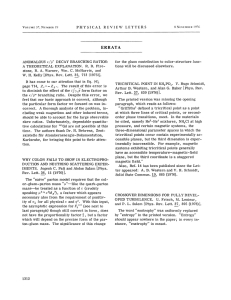Rob_Hill_Iron_based_kappta.pptx
advertisement
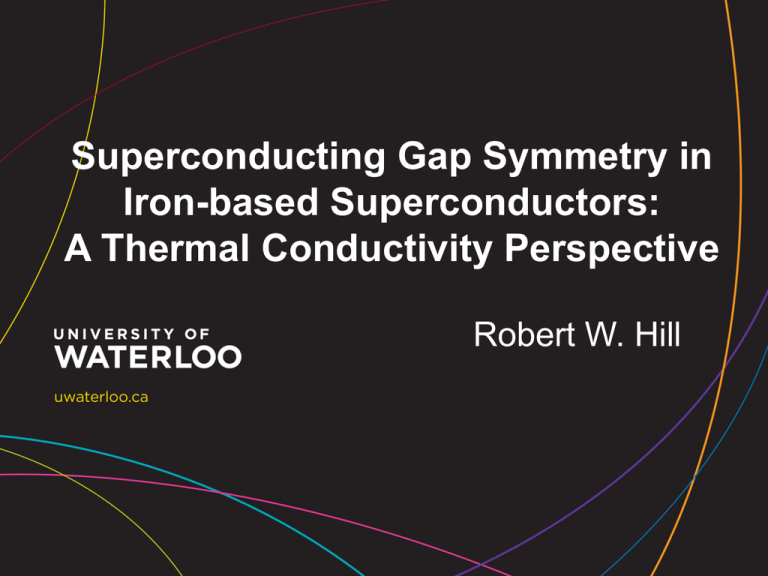
Superconducting Gap Symmetry in Iron-based Superconductors: A Thermal Conductivity Perspective Robert W. Hill Acknowledgements • • • • • • Michael Sutherland (Cambridge) James Analytis (Stanford) Ian Fisher (Stanford) John Dunn (Waterloo, Oxford) Issam Alkhesho (Waterloo) William Toews (Waterloo) Iron-based Superconductors • February 2008: Hosono and co-workers, superconductivity in LaFeAs(O,F), Tc~26 K J. AM. CHEM. SOC. 2008, 130, 3296-3297 Iron-based Superconductors Paglione and Greene, Nat. Phys. 6, 645 (2010) 122 family 1111 family Mazin, Nature, 464, 183 (2010) contrast 1: cuprate phase diagram Laboratoire National des Champs Magnétiques Intenses - Toulouse Semi-metallic character hole pocket electron pocket Indirect band gap semiconductor Semi-metal Johnston, D. C. (2010). Advances in Physics, 59(6), 803–1061. Folded & Unfolded BZ FeAs layer unfolded BZ (green) (1-Fe site) folded BZ (blue) (2-Fe sites) Hirschfeld, P. J., Korshunov, M. M., & Mazin, I. I. (2011). Reports on Progress of physics. 74 124508 Fermi Surface (unfolded zone) Bands crossing Fermi-level are derived from Fe d-orbitals Four quasi-2D electron and hole cylinders: Two hole FS at G Two electron FS at X Kemper, A. F., et al. (2010).. New Journal of Physics, 12(7), 073030. Fermi Surface (folded zone) G (k=(0,0)) M (k=(p,p)) Bands crossing Fermi-level are derived from Fe d-orbitals Four quasi-2D electron and hole cylinders: Two hole FS at G Two electron FS at M Mazin, I. I. & Schmalian, J. Physica C 469, 614623 (2009) Superconductivity Pairing is singlet – NMR (Knight shift) measurements Grafe, et al., Phys. Rev. Lett. 101, 047003 (2008). Pairing through phonons unlikely because of weak electron-phonon interaction L. Boeri et al. Phys. Rev. Lett. 101, 026403 (2008) Separate concepts of gap symmetry from gap structure Kuriki et al. Phys. Rev. B 79, 224511 (2009) contrast 2: cuprate gap symmetry s wave d wave Scalapino, D. J. (1995). Physics Reports, 250(6), 329–365 Thermal conductivity in superconducting state k = kelectrons + kphonons Separate contributions using temperature dependence in low temperature limit Kinetic theory formulation: Phonons: κ 13 cvl κ ph 13 βT 3vsl0ph Thermal conductivity: Nodal or fully-gapped? Fully gapped (s-wave) Nodal (d-wave) 3 N (ε ) N (0) 2 superconducting normal 1 0 1 2 e/D 3 activated behaviour at low T k0 0 as T 0 K T g impurity bandwidth κ e 13 γTvF l0e finite k0 T nodes Example 1: filled-skutterudite materials Finite value establishes presence of nodes Consistent with fully gapped superconducting state Hill et al., Phys. Rev. Lett. 101, 237005 (2008) Example 2: YBa2Cu3O7 Hill et al.. Phys. Rev. Lett. 92 027001 (2004) LaFePO (1111 family) •Stoichiometric superconductor, Tc = 7 K, non-magnetic groundstate •Isostructural to LaFeAsO, non-superconducting (dope with F to get Tc~26 K) •FS established from dHvA and ARPES •Anisotropy in transport measurements ~ 15-20 •Single crystal sample •RRR 85 •Small sample (100 x 75 x 25) mm3 •Contacts made using evaporated gold pads P Carrington et al., Physica C 469 (2009) 459–468 LaFePO: Thermal conductivity LaFePO: Thermal conductivity Phonons = 1.2 T3 mW/Kcm (fitted) = 1.0 T3 mW/Kcm (spec. heat) Electrons LaFePO: d-wave? Quasiclassical d-wave theory Graf, Yip, Sauls and Rainer, PRB, 53, 15147 (1996) 3.5 + 8.7 T 2 (up to 400mK) Universal linear term estimate: = 2.9 mW/K2cm Use spec. heat: C/T = 10.6 mJ/K mol Kohama et al. JPSJ 77 094715 (2008) LaFePO: d-wave? Graf, Yip, Sauls and Rainer PRB, 53, 15147 (1996) Not T3, more T2 – inconsistent with d-wave LaFePO: Nodal s+/- wave? Non-universal linear term Qualitatively similar T dependence Mishra, et al., Phys. Rev. B 80, 224525 (2009) LaFePO: Field Dependence Numerical work for nodal s+/- Mishra, et al., Phys. Rev. B 80, 224525 (2009) LaFePO: Wiedemann-Franz Law Scattering Rate Normal state - if d-wave, would expect significant Tc suppression LaFePO: other experiments Penetration depth Power law T dependence Consistent with nodes Fletcher et al., PRL 102, 147001 (2009) Thermal conductivity in other iron-based superconductors Paglione and Greene, Nat. Phys. 6, 645 (2010) d-wave in KFe2As2? Scattering rate between these sample differs by factor ~ 10 r0 ~ 0.21 mW cm r0 ~ 2.2 mW cm Universal Conductivity! J-Ph. Reid et al., (2012) arXiv:1201.3376v1 J. K. Dong et al., Phys. Rev. Lett. 104, 087005 (2010) Summary and Conclusions LaFePO Finite residual electronic conduction in zero temperature limit - evidence for nodes in superconducting gap. Quantitatively consistent with universal d-wave value - However, electronic temperature dependence qualitatively inconsistent (not T3). Qualitatively consistent with nodal s+/- wave. - Require methodical impurity dependence and numerical quantitative analysis. In broader picture of iron-based superconducting families, the sensitivity of the gap topology to Fermi surface details (because of a magnetic coupling mechanism) makes the observation of both nodes and fully-gapped structure a possibility within the same s+/- symmetry order parameter. For sufficiently high doping, FS may be altered enough to drive symmetry change from s+/- to d-wave (see Louis Taillefer’s talk in main meeting). Overdoped theory
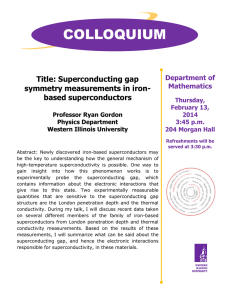
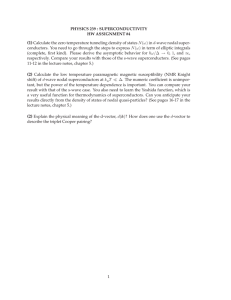
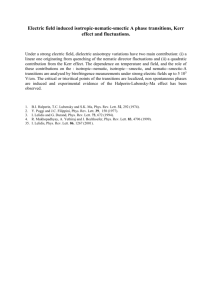
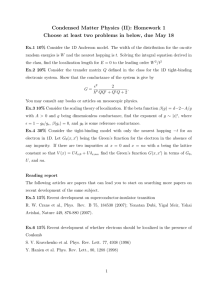
![[1]. In a second set of experiments we made use of an](http://s3.studylib.net/store/data/006848904_1-d28947f67e826ba748445eb0aaff5818-300x300.png)
